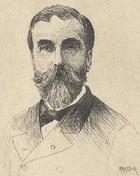
In 1852 Ludovic Halévy works in the public administration as head of the direction of the Ministry of Colonies. He collaborated with the Duke of Morny, in the legislative body, while working on his libretto for the operetta "Monsieur Choufleuri restera chez lui", with music by Jacques Offenbach (1861). His literary career quickly achieved so much prestige that he was allowed to leave his administrative job in 1865. He collaborated in the composition of numerous operetta libretti with León Battum, Hector Crémieux and, especially, with Henri Meilhac (1831-1897) with whom he wrote most famous operettas by Jacques Offenbach: La Belle Hélène (1864); La vie parisienne (1866); La Grande-Duchesse de Gérolstein (1867) and La Périchole (1869); and the libretto by Carmen de Georges Bizet (1875). Both, Henri Meilhac and Ludovic Halévy, also write, vodeviles and comedies: Les Brebis de Panurge (1863); Fanny Lear (1868); Froufrou (1869); Trichoche and Cacolet (1872); Le Prince (1876); La Cigale (1877); Le Mari de la débutante (1879). From this collaboration, which lasted more than twenty years, it is difficult to determine which of the two was more relevant in the composition of all these works. If judged by the works that Ludovic signed alone, he had as much ingenuity and vivacity as his partner, more taste, refinement, depth and humanity, but less euphoria and imagination. Halévy creates the characters of the Cardinal family, symbol of the Parisian petty bourgeoisie, pompous, pedantic and malevolent. He wrote two novels L'Abbé Constantin (1882) and Criquette (1883) that were very successful at the end of the 19th century. Breaking with the obscurantism of naturalistic novels, these novels described a world in which, although realistic, all the characters were good and virtuous. This success opened the doors of the French Academy occupying, on December 4, 1884, armchair 22, succeeding Joseph Othenin d'Haussonville. His official reception took place on February 4, 1886. He gave his unsuccessful support to the numerous candidacies of Émile Zola, and practically stopped writing. Towards 1878, Ludovic Halévy, together with his niece Geneviève Bizet, future Mrs. Strauss and promoter of a well-known literary salon, received "everything" artistic and literary Paris. In his apartment on Douai Street, 22, "Thursdays of Ludovic", he shared a conversation with Edgar Degas, Gustave Moreau, Edouard Dubufe, Édouard Manet, John Lemoine, Georges Ohnet, Charles Gounod, Henri Meilhac, Charles Hass, Viscount Eugène -Melchior de Vogüe, Guy de Maupassant, Alexandre Guiraud, Georges de Porto-Riche, Émile Straus or Robert de Montesquiou. Ludovic Halévy was the son of the polygraph Leon Halévy (1802-1883) and nephew of the composer Jacques Fromental Halévy (1799-1862). By his marriage in 1868 with Louise Breguet, he was the son-in-law of Louis Breguet (1804-83), watchmaker and physicist. From this union they were born, Élie Halévy, historian of England (1870-1937) and Daniel Halévy (1872-1962), essayist and historian. He was the father-in-law and the grandfather of politicians Louis Joxe (1901-91) and Pierre Joxe (1934). He was also the political uncle of the aviator Louis Charles Breguet. His cousin, Geneviève Halévy, daughter of Jacques Fromental Halévy, married Georges Bizet in 1862 and subsequently married Émile Strauss.




